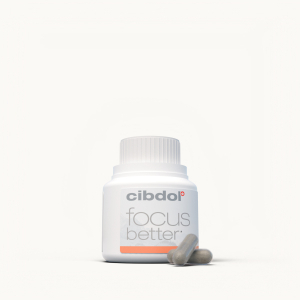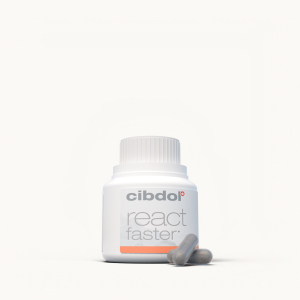Focusing on what
matters
Focus Information Page

Sharpen your mind
The object of your focus could be work, it could be gaming—it could even be studying or chores at home. Whatever your "something" is, focus helps your mind dedicate its attention to the task at hand. But how do you focus when the world is full of distractions?
- What is cognitive performance?
- Enhancing your brain's ability to adapt
- Improving cognitive performance
- Cognitive decline: Small steps you can take
- Ingredients that may help
Our focus suggestions
What is cognitive performance?
Focus is the culmination of several key areas, which, combined, constitute our cognitive performance. Essentially, focus is how well our brain can problem solve and adapt to mentally taxing situations.
However, the brain isn't continuously in a hyper-focused state, nor does it need to be. Instead, what's important is that when we need to focus on an object, person, or task, we can ramp up our cognitive performance to meet the demand.
By training several key areas, we can improve the speed at which our brain reaches "peak performance", and the limits of that threshold. Moreover, training our brain is an excellent way to combat cognitive decline, an unavoidable symptom of ageing.

Enhancing your brain's ability to adapt
Brain plasticity may sound like an intimidating term, but the idea is simple—it's our brain's ability to adapt to changing demands, including the restructuring and reorganising of synaptic connections. It's our brain's greatest skill, but it is just that—a skill. And to become proficient in any skill, you need to practise.
The more we test our mental abilities, the better our ability to focus, learn, react, and comprehend. Similar to how training in the gym or running a 5K strengthens muscles or increases endurance, the more we test our brain plasticity, the faster, stronger, and more confident our minds become. Improving brain plasticity typically centres on the following three areas:
Memory
Our memory retains and stores information for us to use later. We keep most information only briefly (short-term memory), while some becomes ingrained in our subconscious (long-term memory). We also have sensory memories—e.g. sights, sounds, and smells—which are catalogued for only a few seconds before being reprocessed.
Concentration
When we're focusing on a single thought or task—that's concentration. You can almost think of it as a specialised form of focus. Concentration also influences decision-making, meaning it's essential in facing the challenges of modern living.
Reaction
Reaction dictates the speed at which we can respond to information and stimuli. Think catching a ball or avoiding something on the pavement. Your brain is responsible for processing signals from your central and peripheral nervous system, turning them into a meaningful reaction.

Improving cognitive performance
With the three areas above in mind (no pun intended), below are several activities that can improve overall cognitive performance.
Neurotechnology
There exist advanced electronic devices that interface with the nervous system and neural activity. A sophisticated approach to brain plasticity, these devices encompass deep brain stimulation, cochlear implants, and brain-computer interfaces.
Workbooks
Cognitive workbooks provide various mental exercises, with different editions meant to test different functions, such as memory, attention, and awareness. There are even workbooks that deal with specific psychological disorders like anxiety and depression.

Supplements
Nootropics (also known as smart drugs or cognitive enhancers) are substances that may improve brain performance. Aside from prescription options, popular nootropics dedicated to boosting focus include caffeine, omega-3 fatty acids, and L-theanine.
Brain training
Fun and interactive, brain training can accommodate virtually any kind of plasticity enhancement. Brain training usually comes in the form of interactive games or puzzles, and is a rewarding way to improve mental focus and memory skills.

Cognitive decline: What steps can you take?
Cognitive decline is a natural and ultimately inevitable part of life. However, just like a muscle is less prone to injury if it's strong and well looked-after, a well-conditioned mind is better equipped to deal with memory loss and other cognitive issues.
Our brain epitomises the expression, "use it or lose it". So if you're interested in conditioning your brain and staying focused, below are several small steps you can take.

Exercise regularly
Activity that raises the heart rate gets blood pumping around the body, increasing oxygen to the brain. This not only releases essential hormones and neurochemicals, but it may even stimulate brain plasticity via the growth of new connections.

Stay mentally active
Your brain functions just like a muscle, which means if you don't train it regularly, its capacity decreases. Focus on fun and engaging mental activities such as brain training. Playing cards, finishing a crossword, or completing a puzzle are great examples.

Eat a Mediterranean diet
With an emphasis on plant-based foods and healthy fats, the Mediterranean diet is teeming with omega-3 fatty acids, a natural nootropic. You’ll also benefit from less red meat, salt, and processed foods than typical Western diets.

Socialise
Social interaction is a fantastic way to encourage brain plasticity. Talking with friends and family not only helps your brain process complex problems, but it can help to keep depression, stress, and other psychological conditions at bay.

Get plenty of sleep
Restful sleep plays a fundamental role in the processing and cataloguing of information. Although the body may appear to do nothing while we sleep, the brain is a hive of activity, using the time to generate and repair neurological connections.

Supplements and nutrition
The brain needs resources to function, most of which come from the food and drink we consume. Vitamins, minerals, and other supplements can help to balance the body's nutritional needs, keeping it in peak condition.
Ingredients that may help
| Botanicals | Ariona Berry Extract (Brainberry®), Ginko Biloba, Caffeine, L-Theanine, Panax Ginseng, Zinc, Folate, Magnesium, Zeaxanthin | Cibdol products that contain Botanicals are: Focus Better React Faster |
| Vitamins | Vitamin A, Vitamin B12, Vitamin D, | Cibdol products that contain Vitamins are: CBD Vitamin B12 Formula CBD Vitamin D3 Formula CBD Immune Booster |
| Other | Ginger, Hops, Oregano, Omega 3 | Cibdol products that contain these ingredients are: CBD Immune Booster |
When complete focus is required, Cibdol's range of natural supplements is here to support your mind and body.














